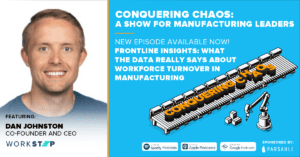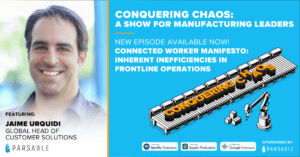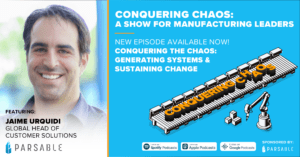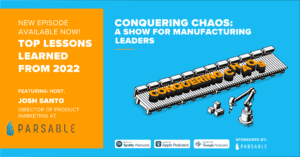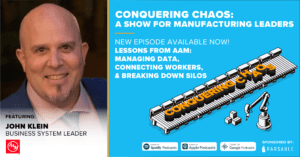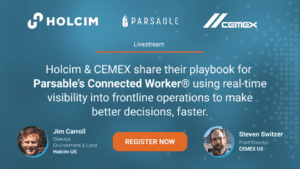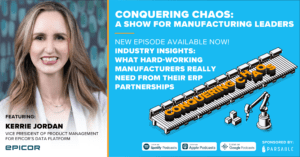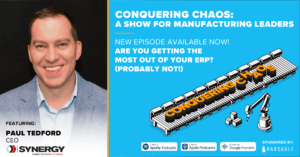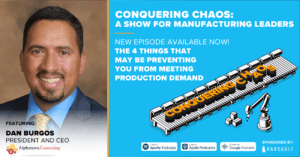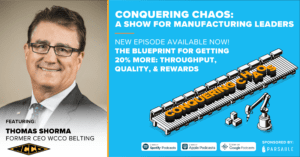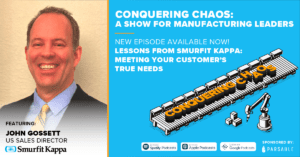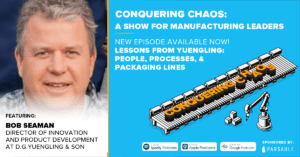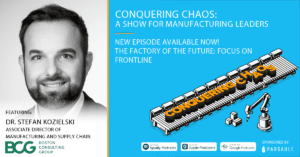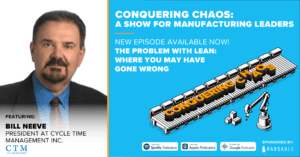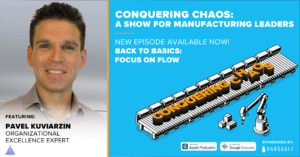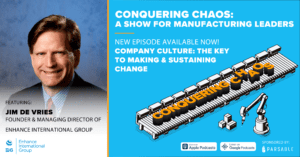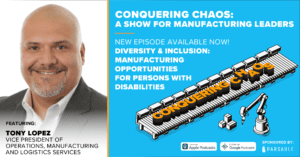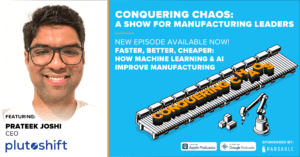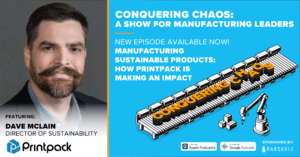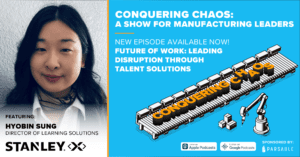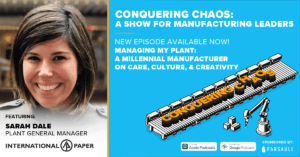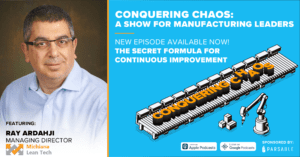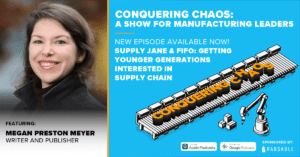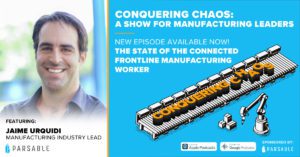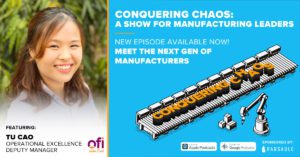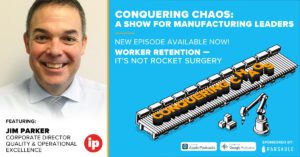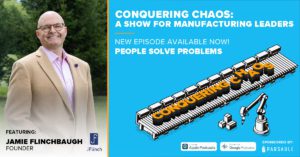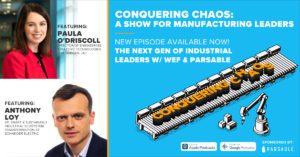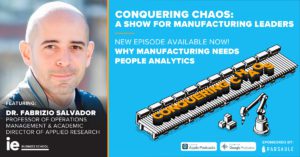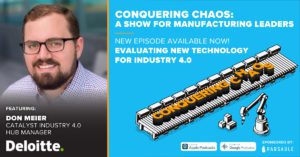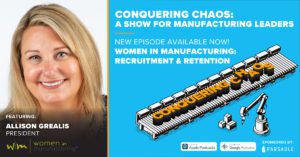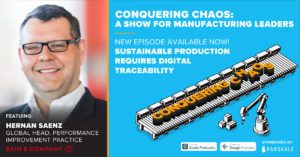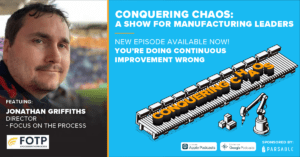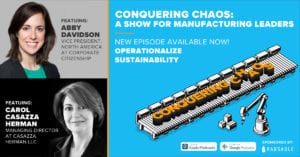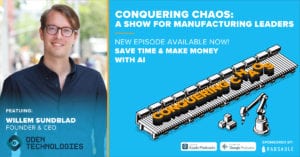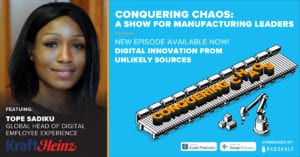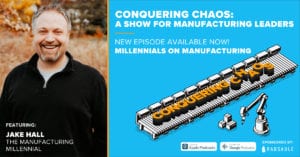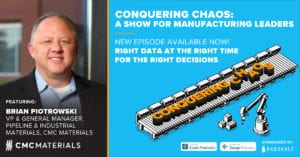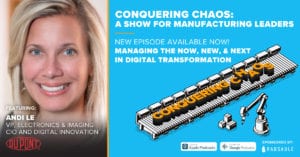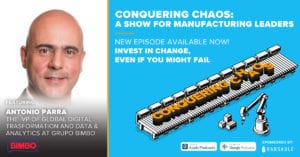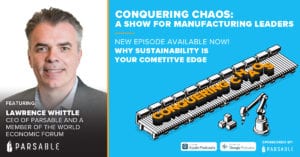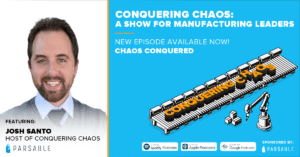
We’re living in a time of innovation. With Industry 4.0 and Digital Transformation on the horizon, new, emerging technologies are taking the industry by storm. Close to the top of that list is Extended Reality. But how much of it is hype and how much is (actual) reality?
In this episode of Conquering Chaos, we delve into the ways in which these technologies are improving the lives of frontline workers and the efficiencies of manufacturers..
We’re joined by fellow podcast host and technology fellow for a global manufacturing company, Scott Burkey. We speak with Scott about how these technologies are being used to improve worker training and implementation. From training simulations to remote troubleshooting, virtual and augmented realities are transforming the experience of frontline workers. We also discuss the potential for these technologies to revolutionize the entire manufacturing process, from design to production to maintenance and more.
Join as we discuss:
The reality of XR including AR VR, and MR
The immediate impact on the lives of frontline workers
How to tap into tribal knowledge with tenured workers to train the next generation
How extended realities are connecting workers
As predictive data rolls in, the potential for a growing gap in talent in manufacturing is becoming more pronounced as a majority of manufacturers are faced with difficulties staffing their frontlines— talent needed to keep lines running smoothly and get customers what they need.
In this episode, we’re joined by Dan Johnston, Co-Founder and CEO at WorkStep to discuss these workforce challenges, examine what the data says about turnover, and explore what you can do to attract and retain your workforce as talent density continues to drop.
Join us as we discuss:
Using a company’s scale and strategy to improve business perception
Top reasons for turnover and how you can reduce their impact
Actionable tips for improving workplace satisfaction... Read more
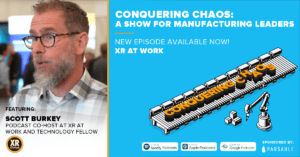
We’re living in a time of innovation. With Industry 4.0 and Digital Transformation on the horizon, new, emerging technologies are taking the industry by storm. Close to the top of that list is Extended Reality. But how much of it is hype and how much is (actual) reality?
In this episode of Conquering Chaos, we delve into the ways in which these technologies are improving the lives of frontline workers and the efficiencies of manufacturers..
We’re joined by fellow podcast host and technology fellow for a global manufacturing company, Scott Burkey. We speak with Scott about how these technologies are being used to improve worker training and implementation. From training simulations to remote troubleshooting, virtual and augmented realities are transforming the experience of frontline workers. We also discuss the potential for these technologies to revolutionize the entire manufacturing process, from design to production to maintenance and more.
Join as we discuss:
The reality of XR including AR VR, and MR
The immediate impact on the lives of frontline workers
How to tap into tribal knowledge with tenured workers to train the next generation
How extended realities are connecting workers
As predictive data rolls in, the potential for a growing gap in talent in manufacturing is becoming more pronounced as a majority of manufacturers are faced with difficulties staffing their frontlines— talent needed to keep lines running smoothly and get customers what they need.
In this episode, we’re joined by Dan Johnston, Co-Founder and CEO at WorkStep to discuss these workforce challenges, examine what the data says about turnover, and explore what you can do to attract and retain your workforce as talent density continues to drop.
Join us as we discuss:
Using a company’s scale and strategy to improve business perception
Top reasons for turnover and how you can reduce their impact
Actionable tips for improving workplace satisfaction... Read more
Manufacturers in North America and Western Europe are facing significant challenges in attracting and retaining talent in 2023. For large manufacturers, it’s particularly difficult.
As predictive data rolls in, the potential for a growing gap in talent in manufacturing is becoming more pronounced as a majority of manufacturers are faced with difficulties staffing their frontlines— talent needed to keep lines running smoothly and get customers what they need.
In this episode, we’re joined by Dan Johnston, Co-Founder and CEO at WorkStep to discuss these workforce challenges, examine what the data says about turnover, and explore what you can do to attract and retain your workforce as talent density continues to drop.
Join us as we discuss:
Using a company’s scale and strategy to improve business perception
Top reasons for turnover and how you can reduce their impact
Actionable tips for improving workplace satisfaction... Read more
In the final part of this 3-part series, we’re joined by fan-favorite Jaime Urquidi, Global Head of Customer Solutions at Parsable, for a deep dive into the world of frontline worker technologies and the connected worker, as well as an exploration of the challenges that come with connecting workers with new technology.
Jaime and Josh examine the most common categories of solutions available for solving a slew of problems experienced on and by the frontline. The two discuss the strengths and weaknesses of each option and explore the journey manufacturers can expect to go on when connecting their workers (no matter how they choose to do so).
Join as we discuss:
A recap of episode 2 with a review of the most commonly used siloed solutions
The most popular types of frontline worker technologies for overcoming inefficiency
What you will experience in your pursuit of connecting your frontline workers... Read more
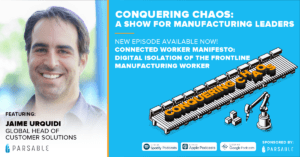
What if the tools you relied on every single day to get the job done were the reason you are experiencing inefficiency? How are you supposed to continuously improve when your options for implementing and sustaining change are limited?
In part two of our three-part series on the connected worker and workforce in manufacturing, we’re joined again by fan-favorite Jaime Urquidi, Global Head of Customer Solutions at Parsable
In this part, Jaime and Josh discuss the challenges ofsiloed solutions in the manufacturing industry. Jaime sheds light on the detrimental effects of relying on common siloed solutions, including the impact it can have on worker reliability and how it causes manufacturers to miss out on opportunities to improve. !
We also dive deeper into digital isolation,how it has affected manufacturing production, and why workers have been left behind in this process.
Join as the two discuss:
A recap of the top takeaways of part 1
How siloed solutions and lack of technology lead to digital isolation on the frontlines
Digital isolation’s impact on manufacturing production and how workers got left behind... Read more
Join us on Conquering Chaos as we kick off a three-part series on the connected worker and workforce in manufacturing with our industry expert (back by popular demand) Jaime Urquidi, Global Head of Customer Solutions at Parsable.
In part 1, Jaime and Josh examine the most common inefficiencies that they’ve encountered while working with manufacturers to digitize frontline operations.. These inefficiencies are inherent within frontline workflows and processes and if left unchecked, they can significantly impact operational results.
Join as the two discuss the:
4 most common inefficiencies and what to do about them
Cost of doing nothing
Role of today’s frontline worker in solving inefficiencies... Read more
Creating lasting change in manufacturing can be a daunting task. With the right strategies, it's possible. But — you have to prioritize it.
In this episode, we explore how to drive impactful change in factories and make that change stick
This week, Jaime Urquidi, Global Head of Customer Solutions at Parsable, discusses his experience in conquering chaos within the manufacturing industry. Jaime has had an impressive career, with highlights including leading multi-site teams that have made a significant impact in the manufacturing space. Jaime also shares how enacting change to your teams can be a challenge but a rewarding one for everyone with the right strategies.
Join as we discuss:
Jaime’s own highlights (and lowlights) as a factory director
Lessons learned from all of those experiences
Making & sustaining change
Short-term sacrifices for long term gain & ROI... Read more
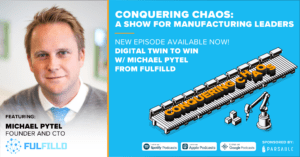
Digital Twin — hyped-up dud of an idea or critical component to the future of manufacturing (and the world)?
In this episode we’re examining fact and fiction when it comes to Digital Twin technology.
Our guest is Michael Pytel, Founder and CTO of Fulfilld. He discusses the implementation and reality of Digital Twins in the industry. Michael offers valuable insights on how digital twins have transformed the industry, and can transform logistic in particular, by providing real-time data and insights. He highlights the benefits of using digital twins, including increased efficiency, improved customer experience, and cost savings. He also shares the challenges that come with implementation and how to overcome them
Join as we discuss:
Fact and fiction surrounding digital twin technology
Benefits of using digital twin technology
Overcoming implementation challenges.
Key considerations for implementing digital twin technology
How to start implementing digital twins
If you like what you heard, you can join Fulfilld and Michael at this year’s Promat Conference in March to continue the conversation!
And if you’re a fan of the show, please fill out this survey to help us improve it!
Conquering Chaos is hosted by Josh Santo, be sure to connect with him on LinkedIn!
P.S. Say “to win” fast and it sounds like”twin.” Is that a sign? Digital To Win, Digital Twin!... Read more
In our 2022 episodes, we've had the pleasure of speaking with industry leaders and experts who have shared their valuable insights and lessons learned. From implementing new technologies to streamlining operations, we've covered a wide range of topics to help manufacturers stay competitive and thrive in today's market. We take a look at the 7 most popular episodes and the biggest lessons we learned from each of those guests. One of the key takeaways from our episodes is the importance of empowering people. We also learned that having a strong company culture and clear communication can lead to improved productivity and employee satisfaction. Another important lesson is the importance of investing in new technologies such as automation and data analytics to stay ahead of the curve. Now, get ready to conquer chaos in 2023! ... Read more
One of the most compelling reasons to digitize your operations is the access you get to new data points that were previously uncapturable. New data points bring new visibility. New visibility brings new insight. And new insight brings new innovation.
But what data points are needed? And are these insights reserved for certain roles? Or can data be a powerful in-the-moment companion to everyone within manufacturing operations? Today’s guest, John Klein, Business System Leader at American Axle and Manufacturing joined to give insight on how new data points combined with powerful visualizations and connected worker technology has enabled people at all levels within their operations to drive innovations.
Join as we discuss the:
Power of frontline activity data
Importance of custom dashboards for data visualization
Challenges of data collecting through paper
New way of connected work for frontline manufacturing operations
Way to scale with frontline analytics... Read more
In a very special episode this week, we’re joined by two experts from the manufacturing industry who are using Parsable to power their digitalization efforts — Jim Carroll, Director of Land and Environment at Holcim, and Steve Switzer, Plant Manager at CEMEX. What’s unique about this conversation is that these two leaders from two competing organizations have found common ground in their effort to improve the day-to-day experiences for their frontline workers. By sharing their experiences and exploring common problems that need to be solved, they’re helping drive innovation within the industry.
Join as we discuss:
Factors driving digitalization on the frontlines
The inefficiencies that occur when using paper-based processes
Finding and implementing a digitalization tool
The power of partnering with Parsable
Results and impacts they’ve accomplished with their team... Read more
Many manufacturers and industrial operations are facing a number of disruptions. There’s workforce disruption, technological disruption, consumer disruption, and supply chain disruption. While there are a number of options for mitigating the impact of each, reshoring stands out as a critical way to minimize supply chain interruptions.
In today’s episode, we are joined by Alberto Villarreal, the Founder and managing Director of Nepanoa, who shares how Mexico’s proximity, young workforce, and skilled labor make it the ideal location for manufacturers looking to reshore or localize aspects of their operations or supply chain. .
Join as we discuss:
What makes Mexico an ideal location for mitigating supply chain disruption
Common misconceptions about establishing operations in Mexico
Obstacles you’ll face and ways to overcome them
How technology helps you get up and running faster
Results and ROI based other organizations have achieved... Read more
Cloud-based ERP, you’ve probably heard of it but are you implementing it effectively for your teams?In today’s episode, we’re joined by Kerrie Jordan, Vice President of Product Management for Epicor’s Data Platform shared the insights on that survey and how cloud-based ERP systems can be effective in solving a significant amount of pain points manufacturers using on-prem and hybrid ERP solutions experience.. Join as we discuss Epicor’s manufacturing insights survey and reportThe power of cloud-based ERP Common misconceptions about cloud-based ERPs How to mitigate disruption during a migration to the cloudEstablishing the ROI on migrating to a cloud-based ERP. You can read the survey results at this link: https://www.epicor.com/en-us/resources/library/manufacturing/report-epicor-manufacturing-insights-2022/... Read more
ERP. If you got it, you probably don’t love it. But you know you need it.When it comes to ERP systems, many manufacturers have a love/hate relationship with their solution. But why? At the end of the day, it is absolutely critical for managing what you produce. Is it caused by gaps in the solution? Shortcomings in the implementation? Shortsightedness in the vendor? What is the root cause of the pain? In today’s episode, Paul Tedford, CEO at Synergy Resources, shared his insight on how manufacturers can get the most out of their ERP system, from selection to implementation and beyond. If you feel some of the love and hate for your own ERP system, this episode is for you.... Read more
Mitigating risk in manufacturing is a tall task for many companies — especially these days. Everything from supply chain, workforce retention and inflation can hinder a company’s profitability without warning. How can a well lead company mitigate these risks without disrupting the flow of production? ... Read more
There are issues that occur in manufacturing that go unreported because frontline workers don’t feel like they’re being heard by leadership. From quality and safety issues to facility improvements, there’s a sentiment that any feedback will just get lost in a black hole. ... Read more
Your customers are not just the end consumer, your customers are all around you. They are the employees who help grow the business and the partners you work with to create sustainable products.
And if you aren’t meeting all of your customer's true needs, you’re in for some rough times.
We speak with John Gossett, US Sales Director at Smurfit Kappa, in this episode to learn more about how he adopted a customer service mindset and the impact it’s had on his ability to enable others to make and sustain change.
Join us as we discuss:
Which customers you may be overlooking
How to identify your customers’ true needs
Enabling your customers to accomplish their goals... Read more
In today’s episode, Bob Seaman, Director of Innovation and Product Development at D.G.Yuengling & Son, joins to share his journey from the nuclear biz to the brewing biz, going from craft brewer to master brewer, and the lessons he’s learned along the way from major brewers like MolsonCoors and Yuengling.
We talk about the thousands of possibilities and things that could go wrong when packaging beer and how he empowers his workforce to take ownership for solving problems.
... Read more
There is a lot of talk out there in the world about how digital transformation is a people-focused transformation, but the application of that seems to get lost. In order for manufacturers to thrive in the factory of the future, we need to place our focus on the user experience and putting people first.
... Read more
Is your Lean implementation a failure?
Here’s a controversial take — it very well may be.
Many manufacturers halfheartedly try to go lean, but overlook critical components of the philosophy. But when done right, manufacturers can make a huge impact.
So what does right look like?
Bill Neeve, President at Cycle Time Management Inc, joins the show to discuss the principles of lean management and how to make it work for your company.
... Read more
Manufacturers experience a multitude of challenges today from issues with the supply chain and material availability to talent recruitment and retention. How can manufacturers remain competitive in this challenging climate?
Pavel Kuviarzin, Organizational Excellence Expert at Future State Engineering, joins the show to share advice and best practices gleaned from 20 years of experience working with manufacturers to achieve breakthrough operational improvements.... Read more
Jim de Vries, Founder & Managing Director at Enhance International Group, has helped countless organizations navigate change and achieve organizational excellence. He shares why culture is so important to driving change and how to create a culture that supports a resilient enterprise.... Read more
Recruiting and retention come up a lot on this show, and for good reason. They are top of mind for leaders across the manufacturing industry.
But Tony Lopez, Vice President of Operations, Manufacturing and Logistics Services at PRIDE Industries, explains that there is one often overlooked group that could help solve manufacturing’s workforce issues—workers with disabilities.
Tony breaks down the many ways that manufacturing organizations benefit from employing this untapped labor market.
... Read more
Machine learning and AI are critical to the future of manufacturing operations.
To get you up to speed on the topic, we spend this episode explaining how they work and showcasing the incredible ways in which industrial companies are implementing them into workflows.... Read more
In this episode, Wendy Pease, a Language Translation Expert and the CEO at Rapport International, joins the show to discuss how manufacturers today can attract, engage, and retain local members of foreign-born communities.
... Read more
Increasingly, companies are investing in ESG initiatives (environmental, social, and governance). Partly, it's due to a realization of the impact of climate change and a recognition that something has to change.
But promising to make a change and actually making that change are two very different things.
What are the practical steps you can take as a company to start developing more sustainable product offerings?... Read more
In today's world, socioeconomic changes are happening at an increasing rate, which means manufacturing organizations must constantly adapt to keep up.
Hyobin Sung, Director of Learning Solutions at STANLEY X. Their work revolves around innovating for the future of work, including developing solutions to attract, retain, and empower the maker's workforce.... Read more
In our next episode, we chat with Sarah Dale, Plant General Manager at International Paper, about how she landed in manufacturing, how she leads her team, and what organizations can do to recruit and retain the next generation of manufacturing.... Read more
Continuous improvement is the backbone of an organization's longevity.
Without innovation and an incentive for change, the risk of collapse climbs.
But it’s not enough to implement a change — you must equip workers at all levels with the knowledge, skills, and expertise required to sustain change.
Ray Ardahji, Managing Director at MICHIANA LEAN TECH, LLC, knows this better than anyone after over 30 years of helping companies pivot and grow into new systems.... Read more
Data is essential to the supply chain process, but it's not everything.
It’s a tool to be leveraged by the people who ultimately make the decisions. After all, data without business context is meaningless, or even worse, misleading.
Megan Preston Meyer, writer, and publisher at Preston Meyer Publishing, is an expert in supply chain analytics and a proponent of finding the right balance between data and insight.... Read more
During this prolonged labor shortage in the manufacturing industry, there’s been a lot of talking ABOUT frontline workers, but not a lot of talking TO frontline workers. Recently, Parsable sought to fix that.... Read more
It’s no secret that manufacturing and industrial organizations are struggling to recruit and retain millennials and Gen Z workers.
As an aging workforce nears retirement, it has become an urgent issue with companies scrambling to fill these positions.
So, the million-dollar question is: How can we attract the next generation to manufacturing?... Read more
Many industries are struggling to recruit and retain frontline workers. Manufacturers are struggling to meet the demands of today with fewer resources than yesterday. The focus of this episode is on what you can do about it.... Read more
Have you ever wondered what you need to do to empower your people to use their creativity and unique perspective to tackle issues and implement sustainable solutions?
If you have, this is the episode you’ve been waiting for.
Jamie Flinchbaugh, Founder of JFlinch and Co-Founder of the Lean Learning Center and author of the book People Solve Problems, joins the show to explain what organizations need to have in place to make that vision a reality.... Read more
Retaining talent requires you to invest in reskilling and upskilling with a culture of continuous learning in short and convenient increments, and externally, recruiting new talent requires you to partner with universities to train for the skills we need. In this episode, we have a conversation about building the next generation of industrial leaders. ... Read more
In this increasingly connected world, data plays an integral role in understanding and improving businesses. People analytics, in particular, uses data to improve how businesses leverage the creativity and talents of their people.... Read more
Everything in manufacturing is in the process of moving from bits into bytes as part of the digital transformation. Welcome to Industry 4.0 — an era in which operations are getting digitized and net new revenue streams are being generated off of this influx of new data.... Read more
Manufacturing has had a damaging perception—one where the industry is male-dominated and potentially physically dangerous. Despite the modernization of the industry, more attention must be directed to marketing these changes. Only then will the industry see new employee talent, both men and women, enter the field. ... Read more
Making a supply chain 100% traceable is no easy task—requiring multiple standards and certifications within the business in order to prepare for the future.... Read more
When I say full operational, I mean, from the minute you step onto your site, or into your business and out the door. What's that experience? And that's how we have to make continuous improvement part of the complete structure. It sits hand in hand with health and safety... Read more
There's a big concern right now about how do we bring people into manufacturing? New people, particularly people from the younger generation. A significant portion of the workforce, made up of by baby boomers, they're reaching retirement and in some cases, COVID-19 has actually exacerbated that situation.... Read more
There's a plus side to sustainability and ESG. And that's value creation. Large companies now say, ‘If your sustainability program isn't where it needs to be, or you're not mitigating these ESG risks, then you just can't work with us.’ So, it's not an option.... Read more
If you have a faster rate of solving problems than your competitors, you're going to be able to solve more problems, you're going to be more efficient, and you're going to be more differentiated. You don't just want to solve the reactive problems and speed up the firefighting, you want to prevent the firefighting in the first place.... Read more
How do we get the input from all different personas and archetypes that we have in the organization, not just the predominately looking at those who sit in the white collar office space, but everybody?... Read more
People don't care about how much you know until they know how much you care about them. It's important to put people first, not policy, during a merger.... Read more
If you're trying to implement automation for the bottom line, and you're making your workers' tasks more difficult, those workers aren't going to be your workers for long. Companies who are not willing to implement and take new technology and evolve as a process just won't be relevant.... Read more
At a high level, obviously, data is important, but data needs to mean something. You got to have the right data, something that is actionable, something that is meaningful to people in your organization.... Read more
Managing the now, new, and the next in digital transformation is critical for your company's success. In these uncertain times, It's important to understand what did the crisis create and how can we use these new learnings for new use cases.... Read more
Change is inevitable. Investing in change is critical. If you’re just placing safe bets, you’re not going to be moving at the speed of business today. If you don’t pay the cost to fail, you will not be paying the cost to win.... Read more
By 2025, at least 75% of the global workforce will be millennials. To attract and retain a younger workforce, you must empower the workforce through leading the charge on sustainability. Utilizing sustainability as a competitive edge will be the key to longevity within the manufacturing industry. ... Read more







